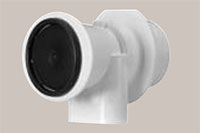Nov 10 2008
International Dispensing Corporation (IDC) today released the results of a Life Cycle Analysis conducted by Allied Development Corporation, a leading packaging industry research and consulting firm, that measured energy use, greenhouse gas (GHG) emissions, and end-use environmental impacts of mainstream large-format packages for milk and juice. Among the packages evaluated were one-gallon high-density polyethylene (HDPE) milk jugs; half-gallon polyester (PET) bottles; one-liter aseptic cartons; and IDC’s Multiserve SafePak. The results of the study will be announced at PackExpo 2008 in Chicago, IL.
 Multiserve SafePak
Multiserve SafePak
Allied Development’s two-part proprietary SavvyPack® system measures energy usage and GHG emissions through each step of the supply chain, including raw material transport, resin production, package manufacture, product filling, and delivery to the retailer or foodservice operator. When all factors were taken into account and results normalized based on the amount of product packaged, the Multiserve SafePak expended significantly less energy and GHG than all the other packages tested. Figuring prominently in these results were the low ratio of packaging material to product sold as well as several factors related to materials, processing, transportation, and refrigeration, all of which accounted for the Multiserve SafePak having the lowest environmental impact of the beverage packages analyzed.
Energy Consumption and Greenhouse Gas Emissions
The study found that compared to a Multiserve SafePak milk package:
- One-gallon standard milk jugs utilize 19.4 percent more energy
- One-gallon stackable milk jugs utilize 25.0 percent more energy
- One-liter aseptic cartons utilize 42.2 percent more energy
The study also found that compared to a Multiserve SafePak juice package:
- Half-gallon PET bottles utilize 122.1 percent more energy
- One-gallon aseptic cartons utilize 50.3 percent more energy
- GHG emissions followed the same pattern, with the Multiserve SafePak expending less than the other formats by similar percentages.
Other Advantages
The results were calculated from before product manufacture through delivery to the retailer or foodservice operator only and did not factor in retail storage and display or home storage. Due to IDC’s unique aseptic dispensing tap, The Answer™, refrigeration is not required during warehousing and display, or throughout the lifetime of the product, providing additional economic and environmental benefits that the study acknowledged but did not quantify. The total environmental benefits of the Multiserve SafePak were, therefore, understated in the study.
Because the study focused exclusively on large-format packages, only the largest package size in each format was selected. If the Multiserve SafePak were compared to smaller milk jugs, PET bottles, and aseptic cartons, the differentials would be even more significant, according to the study.
Recyclability and Landfill Space Reduction
The Allied Development report also measured the of end-of-life environmental impact of each packaging format, factoring in probable reuse, recycling, compacting, and landfill disposal. Due to the minimal amount of packaging and the composition and flexibility of the package, the Multiserve SafePak had the lowest end-of-life impact, accounting for 524 cubic feet of landfill for every million pounds of product, versus 919 cubic feet for standard milk jugs, 1,225 cubic feet for stackable milk jugs, 1,304 cubic feet for aseptic cartons, and 2,994 cubic feet for PET bottles.
“We now have scientific documentation confirming the sustainability advantages of the Multiserve SafePak,” says Greg Abbott, founder and chairman of International Dispensing Corporation. “With our industry focused so intently on sustainability, these findings should be strong encouragement for retailers, processors, and foodservice operators around the world to give our package a serious look. Meanwhile, we are continually working to develop ways to reduce our carbon footprint even further and improve our sustainability scores. Sustainability is an on-going process and we are well on our way.”
Adds Abbott, “Because The Answer allows shelf-stable liquids to be delivered in bulk and dispensed safely over time, the equally important environmental issues of food spoilage and waste are also being addressed in a major way.”